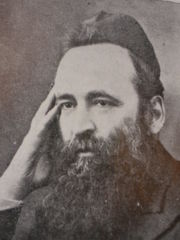by Rabbi Moshe Chaim Luzzato zt'l
with select commentaries
 The Mesilat Yesharim by Master Kabalist Rabbi Moshe Chaim Luzzato (1707-1746) is probably the most popular mussar (ethics) work in Jewish literature.
The Mesilat Yesharim by Master Kabalist Rabbi Moshe Chaim Luzzato (1707-1746) is probably the most popular mussar (ethics) work in Jewish literature.Rabbi Eliyahu of Vilna (1720–1797), one of the most authoritative Torah sages of the modern era as well as a great Kabalist himself, said after reading the Mesilat Yesharim, that were Rabbi Luzzato still alive, he would have walked by foot from Vilna to Italy to learn from him. He stated that having read the work, the first ten chapters contained not a superfluous word.
Rabbi Luzzato himself writes in his book Adir B'Marom: "I will keep my words few, otherwise the burden will be heavy on the writer and on the reader. Just, that you should not read over the words as one who treads a clear path, but rather that you think and contemplate very deeply after each and every step for only then will you succeed. And it is enough for this point..."
Rabbi Shlomo Wolbe zt'l, one the last of the great mussar personalities wrote:
"It is incumbent on a person to review constantly the book Mesilas Yesharim. (Rav Chaim Volozhiner zt'l said to his chief disciple R.Zundel Salanter that he should take the Mesilas Yesharim as his road map for life.)
At first the book may seem simple but really the more a person matures and grows in understanding, the more he will see wonders in depth and breadth in the Mesilas Yesharim Rabbi Yerucham zt'l was accustomed to say that the Mesilas Yesharim is the summation of all the kaballa books of the Ramchal and is therefore also the preparation gate to learning the inner chambers of the Torah... as one studies and reviews this book carefully, slowly slowly he will find the inner meanings in his (the Ramchal's) words - and in ourselves. (from beginning of Alei Shur vol.1 by Rabbi Shlomo Wolbe)
Rabbi Yaakov Hillel, a famous contemporary kabalist wrote:
Those who delve deeply and proficiently in the works of the Ramchal know that his primary aspiration in his books was to clarify the details of the secrets of Atzilut written in the esoteric, spiritual language of the writings of the Arizal and enclothe them into simple terms of our world... Indeed his first books appear similar in character to the works of the Arizal but his later books were composed in simple language appearing like familiar, revealed matters. But in truth, their foundations draw from the loftiest holy mountains... One can trace virtually all of his words, in minutest detail, to faithful sources in the writings of the Arizal and the holy Zohar. This is the novelty in his writings. It is all laid on the foundations of the ancients. But in his brilliance he concealed and disguised his words in language that appears simple. This is so for his works in Kabala and all the more so for Derech H-ashem, and especially his wondrous book Mesilat Yesharim... It is all built on the foundations of the Torah of Sod (Kabala).
 The following is a translation with select commentaries of the Mesilas Yesharim. In preparing this, I consulted with the old shechem.org translation and also the Ofeq Institute and Feldheim versions. I also added excerpts from various commentaries to aid a bit in proper understanding of the extremely concise language. It is proper to study the book slowly and in its entirety, for it is a most difficult and central topic as Rabbi Dessler writes (Michtav M'Eliyahu 1:77):
The following is a translation with select commentaries of the Mesilas Yesharim. In preparing this, I consulted with the old shechem.org translation and also the Ofeq Institute and Feldheim versions. I also added excerpts from various commentaries to aid a bit in proper understanding of the extremely concise language. It is proper to study the book slowly and in its entirety, for it is a most difficult and central topic as Rabbi Dessler writes (Michtav M'Eliyahu 1:77):
There are many branches of wisdom in the world. But what is the broadest and deepest one which requires the most explanation due to its vast depth and extreme subtlety and great proneness to error? Which wisdom towers above all other wisdoms to such a colossal extent that it alone is worthy of being called "wisdom"?Rabbi Yosef Sebag studied in various yeshivas under great Torah scholars such as Rabbi Dov Shwartzman zt'l (~2 years), Rabbi Nachman Bulman zt'l, Rabbi Nissan Kaplan (~5 years). He also completed a degree in physics at the University of Massachusetts, Amherst and was a research associate in nuclear physics for some time before heading off to yeshiva. He also translated the Chovot Halevavot available at www.dafyomireview.com/384
We should ask the wisest of all men, but scripture already told us: "Hen fear of G-d - this is wisdom" (i.e. it alone is worthy of being called wisdom Shab.31b). Unfortunately, we may learn from here the degree of our foolishness, for indeed we don't even realize at all that it is a wisdom! And we cannot even grasp why it is the greatest wisdom. We lack even a tiny glimpse of the complexity of this exceedingly vast and deep wisdom.... Furthermore this clarity needs to be specifically in our hearts, not just intellectually. Recognition of the heart is extremely difficult (for it only comes after deep perception and clarity)...
Approbation Letters
Rabbi Yitzchak BreitowitzRabbi Zev Leff
 download
download